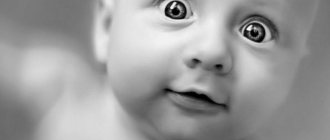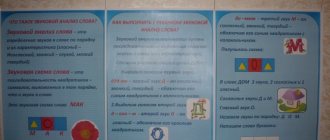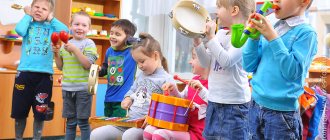Mikheeva Mila
Didactic games for developing the syllabic structure of words
Didactic games for developing the syllabic structure of words.
To make it easier for a child to learn the structure of a word , the teacher needs to involve as much motor activity as possible, since with movement the child will better consolidate speech material. Words of different syllabic structures can be clapping , tapping, jumping, stepping away, and so on.
At the preparatory stage, exercises are carried out first at the non-verbal level, and then at the verbal level.
Exercise “Repeat the same”
Goal: learn to reproduce a given rhythm.
Materials: ball, drum, tambourine, metallophone, sticks.
Progress of the exercise: The speech therapist sets the rhythm with one of the objects, the child must repeat the same.
Exercise “Count correctly”
Goal: learn to count sounds.
Material: children's musical and noise instruments , cards with numbers, cube with dots.
Game "Name of a fairy-tale character"
Goal: improving the skills of syllabic analysis and synthesis.
Objectives: develop phonemic hearing; Exercise students in the ability to divide words into syllables.
Equipment: cards with a set of words.
Option 2
Instructions: write out the stressed syllable from each word - and you will find out the name of the fairy-tale character.
- Milk, horse, ball. (Kolobok.)
- Gold, dumplings, locker. (Cinderella.)
- Mask, morning, clay. (Mowgli.)
- Boy, TV, wall. (Malvina.)
Game “Read the word by the syllable number in the name of the picture”
Goal: improving the skills of syllabic analysis and synthesis.
Objectives: develop phonemic hearing; practice the ability to highlight a certain syllable; develop the skill of writing vocabulary words.
Equipment: cards with pictures.
Instructions:
- name what is drawn;
- determine the number of syllables in each word;
- find the indicated syllable in each word, write it down in your notebook;
- read the resulting word;
- Underline the “dubious place” (spelling) in this word.
Exercise “Repeat the same”
Goal: learn to reproduce a given rhythm. Materials: ball, drum, tambourine, metallophone, sticks. Progress of the exercise: The speech therapist sets the rhythm with one of the objects, the child must repeat the same.
Exercise “Count correctly”
Goal: learn to count sounds. Materials: children's musical and noise instruments, cards with numbers, cube with dots. Progress of the exercise: Option 1. The child claps his hands (knocks on a tambourine, etc.) as many times as there are dots on the cube. Option 2. The speech therapist plays sounds, the child counts them and picks up a card with the corresponding number.
Exercise “Choose a scheme”
Goal: learn to correlate the rhythmic pattern with its diagram on the card. Material: cards with patterns of rhythmic patterns. Progress of the exercise: Option 1. The speech therapist sets a rhythmic pattern, the child selects the appropriate pattern on the card. Option 2. The child reproduces a rhythmic pattern according to a given pattern.
Exercises at the sound level:
- “Say the sound A as many times as there are dots on the die. Make the sound O as many times as I clap my hands.”
- “Find out what sound (series of sounds) I made.” Recognition by silent articulation, pronunciation with voice.
- Determination of a stressed vowel in a stressed position (in a series of sounds).
Exercises at the syllable level:
– Pronounce a chain of syllables while simultaneously stringing rings onto a pyramid (building a tower from cubes, rearranging pebbles or beads) – “Fingers say hello” – pronounce a chain of syllables while touching the fingers of the hand with the thumb on each syllable. - Count the number of syllables spoken by an adult. – Name the stressed syllable in the chain of heard syllables. – Memorizing and repeating chains of different types of syllables.
Word level exercises:
Ball game
Goal: learn to clap the syllabic rhythm of a word. Material: ball. Progress of the game: the child beats the rhythm of the word given by the adult with the ball.
Game "Telegraph"
Goal: to develop the ability to divide words into syllables. Material: sticks. Progress of the game: the child “transmits” the given word by tapping out its rhythmic pattern.
Game "Count, don't make a mistake"
Goal: to learn to divide words into syllables while simultaneously performing a mechanical action. Material: pyramid, cubes, pebbles. Progress of the game: the child pronounces the words given by the speech therapist and lays out pebbles (pyramid rings, cubes). Compare words: where there are more pebbles, the word is longer.
Ball game "Pass it on"
Goal: to learn to divide words into syllables while simultaneously performing a mechanical action. Material: ball. Progress of the game: children pass the ball to each other and at the same time name the syllable of the given word.
Game "Say the correct word"
Goal: to learn to distinguish correctly sounding words. Material: pictures. Progress of the game: the speech therapist pronounces the words incorrectly, the child names the words correctly (if it is difficult for the child to complete the task, then pictures are given to help).
Exercise “What has changed?”
Goal: to learn to distinguish between different syllable structures of words. Material: pictures. Progress of the exercise: the child explains the difference between words. Words: cat, cat, kitten, house, house, house.
Exercise “Find the longest word”
Goal: to consolidate the ability to divide words into syllables. Material: pictures. Progress of the exercise: the child chooses from the proposed pictures the one that shows the longest word.
Exercise “Count, don’t make a mistake”
Goal: to strengthen children’s ability to divide words into syllables. Material: pictures, cards with numbers. Progress of the exercise: The speech therapist shows pictures, the children show a number corresponding to the number of syllables in a word (a complication option is the number of a stressed syllable).
Exercise “Which word is different”
Goal: learn to distinguish words with different rhythmic structures. Material: pictures. Progress of the exercise: the speech therapist names a series of words, the children identify the extra word (use pictures if the children find it difficult). Words: tank, crayfish, poppy, branch. Carriage, bud, loaf, plane.
Exercise “Name the same syllable”
Goal: to consolidate the ability to compare the syllabic structure of words. Material: pictures. Progress of the exercise: the child must find the same syllable in the proposed words (airplane, milk, straight, ice cream).
Game “The end of the word is yours”
Goal: learn to synthesize words from syllables. Material: ball. Progress of the game: the speech therapist begins the word and throws the ball to the child, he adds the same syllable SHA: ka..., va..., Yes..., Ma..., Mi...
The material was prepared by teacher-speech therapist O. B. Zhaivoronok.
Didactic games for the development of sound-syllable analysis of words
8.“How many sounds did you hear?”
The teacher expressively pronounces individual sounds and syllables mixed together (m, ra, u, us, we, k...). Children clap 1 time per sound, 2 times per syllable.
9."Roll Call"
The teacher names different sounds mixed together - vowels and consonants. Children whose names begin with the named sound stand up.
10."Let's build a house"
The teacher says that he is going to draw a house and draws only one wall on the board. Children must name the parts of the house that need to be completed. You can name only those words that have the sound “r”. Children call: “Roof, attic, frame, porch, chimney. The teacher draws all the named objects schematically on the board.
11."Look up the word"
The teacher says that in the Russian language there are words that like to play hide and seek. These are short words, they are hidden in longer words. In order to find a short word, you need to divide the long one into syllables. For example, you need to find the word that is hidden in the word “sand”. (Children divide words into syllables - sand). What word was hidden? (Juice).
The teacher names other words in which the second syllable is an independent word: fisherman, Boris, pie, fist, beans, king. Children look for words “hidden” in them.
12."Carlson's Diet"
Goal: to teach how to find words starting with a given letter and read them (if it’s difficult, with the help of a teacher).
Benefits: 1) toy - Carlson;
2) cards with words:
M - milk, butter, meat, ice cream, fruit drink, marmalade, pasta;
K - candy, strawberry, coffee, cutlet, cupcake, potato, compote.
Progress: Educator: “Carlson revealed his little secret to me today. It turns out that in order to feel good and not get too fat, Carlson will go on a diet - one day he will eat foods that begin with the letter “M”, and the next day - with the letter “K”. This is what the doctor advised him and also wrote down the foods he should eat. But Carlson can’t read. So he came to us for help. Let's help him find products starting with the letter "M". Whoever finds it reads (if it’s difficult, the teacher helps). Carlson's diet can be any letter.
13."Chain of Words"
. Goal: develop attention, learn to find a word starting with a given letter.
Aids: 1) cards with words: nose, elephant, rhinoceros, geese, turkey, cow, orange, hole, watermelon, tooth, badger, mole, throne;
2) toy “Parsley”.
Organization: cards are laid out mixed on the table. Children stand around the table.
Progress: the game is played in two versions:
1. Educator: “Today Parsley will play with you. He can't read words yet, but he knows individual letters. Now Parsley will pick up a card with a word, and you must find the word starting with the last letter. Whoever finds it first gets a card. Let's see who is the most attentive and smart. For example, Parsley picks up the word “badger”; it ends with the letter “K”. You must find a word starting with this letter (mole).




